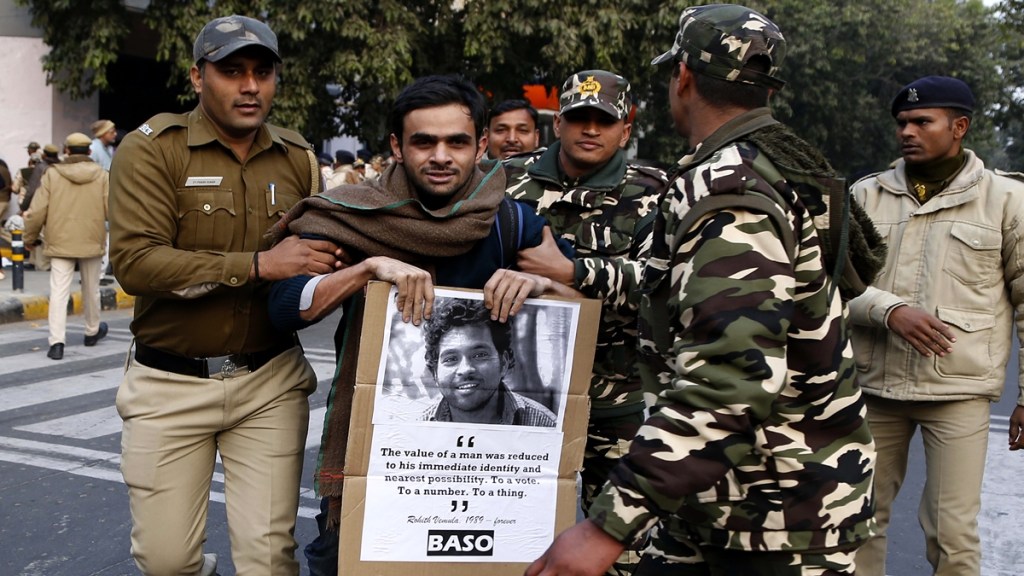The Supreme Court on Wednesday adjourned the hearing on the bail plea filed by former Jawaharlal Nehru University (JNU) student and activist Umar Khalid for the eleventh time in the 2020 Delhi riots case. He has been incarcerated since September 2020 under the stringent provisions of the Unlawful Activities (Prevention) Act.
The Delhi Police had arrested Khalid on September 13, 2020 accusing him of being the “key conspirator” in the violent clashes that broke out in north-east Delhi between February 23 and February 26, 2020, between supporters of the Citizenship Amendment Act (CAA) and those opposing. The communal riots left 53 dead and over 700 injured.
Police claimed that the violence was part of a larger conspiracy to defame Prime Minister Narendra Modi, and further claimed that the protestors had secessionist motives and were using the “facade of civil disobedience” to destabilise the government.
At Wednesday’s hearing in the Supreme Court, a bench of Justices Bela M Trivedi and Pankaj Mittal deferred the matter as the bench was available only till lunch. “List on January 31. High on board,” the bench said.
On January 10, the Court had granted a “final” adjournment in the matter since both parties had requested the same.
Earlier, in November 2023, the Supreme Court had adjourned the hearing in the bail plea due to non-availability of counsel on both sides.
In 2022, a Karkardooma court had denied bail to Khalid, following which he had approached the Delhi High Court, which also denied him bail in October 2022.
The High Court had rejected Khalid’s bail plea, saying that he was in constant touch with the other co-accused and the allegations against him were prima facie true, and that the actions of the accused qualified as “terrorist act” under the Unlawful Activities (Prevention) Act. Khalid then filed an appeal before the Supreme Court.
In July 2023, the Supreme Court said that it will decide on the matter in “just one to two minutes”. A month later, Justice Prashant Kumar Mishra had recused himself from hearing the plea.
On July 12, the Delhi Police had sought time to respond to Khalid’s petition.
On August 18, the matter was adjourned again, so that it could be listed on a non-miscellaneous day (Tuesdays, Wednesday or Thursdays) when lengthy hearings take place.
Later, the matter again came up on September 5 last year before Justices Bela Trivedi and Dipankar Dutta, and the matter was adjourned by a week due to the unavailability of senior advocate Kapil Sibal, who is the counsel of Khalid.
A bench of Justices Aniruddha Bose and Bela M Trivedi on September 12, had indicated that the matter required a detailed hearing.
Meanwhile, several activists have stood in solidarity as he completed his 1,000 days of incarceration in the Delhi riots case last year.
Rashtriya Janata Dal (RJD) leader Manoj Jha had said, “This is 1,000 days of imprisonment as well as as 1,000 days of resistance.”
“This solidarity is not just for Umar, but for every political prisoner. This is a fight of memory. A dominant memory is mainstream today, while the memories of marginalised communities are ignored,” he had said at the Press Club on the topic “Democracy, Dissent and Censorship”.
Khalid’s father SQR Ulyas had said that the confines of the prison walls were not able to “dampen the spirit of his son”, adding that his son was fighting for the country and democracy.
Meanwhile, Khalid’s partner Banojyotsna Lahiri, in a post on ‘India Love Project’, an Instagram account that shares love and marriage stories “outside the shackles of faith, caste, ethnicity and gender”, describes the time with Umar Khalid “as being in long distance relationship while being in the same city”.
“We meet once a week—across a glass partition in Delhi’s Tihar Jail and talk on an intercom. We laugh, joke, and don’t discuss sad things. It’s only when I walk out alone that I feel sad,” she writes in the post.
Both of them met in 2008 and in 2013 they started dating each other, she says.
“They took Umar’s liberty away, but for happiness, we are still fighting. We have grown closest in these years when we have been forced to be apart,” she added.
Amnesty International India’s Chair of Board also held that the repeated denial of bail to Umar Khalid is a “huge blow to everyone exercising their rights to freedom of expression and peaceful assembly in the country”. “Khalid’s continued detention under UAPA runs absolutely counter to the international human rights law and standards,” it had said.

